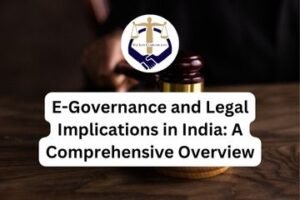Health Surveillance and GDPR: Lessons for India’s Data Protection Regime
Written by Samridhi Upadhyay
Abstract
Health surveillance means the monitoring of diseases and public health trends. It facilitates health crisis management by governments and hospitals but also raises fears regarding privacy. The GDPR of the European Union is one strict law protecting personal data, including health data. India’s new Digital Personal Data Protection Act (DPDPA) is still evolving and can learn a lot from GDPR. The paper will describe the way GDPR deals with health data, the issues concerning health surveillance, and recommendations for improving data protection legislation in India.
Introduction
Countries the over world and health authorities practice an enormous amount of health data about diseases and bettering the practices of health care value. Useful as it may be, this remains a double-edged sword. The very fact that health data are generated creates concern regarding their misuse. GDPR then specifies the very tight restrictions to be placing such protection all the way through, protecting against abuses to the other the preservation of public health. Contrarily, the laws of India are quite new and need to guarantee that civil liberties are not decreased while health surveillance can perform its functions.
This paper will provide insights into the ways the GDPR accepts health data and what India can learn from it. It will go through the main articles of the GDPR, the health landscape at a glance, and how India can perhaps improve its own.
What is Health Surveillance?
Health surveillance is when governments and health organizations collect and study health data to track diseases, find patterns, and improve healthcare. It helps in detecting outbreaks and making better policies. However, because a lot of personal data is involved, there are concerns about how this information is used and protected. Different countries have different laws for handling health data. GDPR is one of the strictest data protection laws in the world, setting high standards for privacy. India is working on its data protection laws, but they are still developing. To make sure health data are used
responsibly, India can take lessons from GDPR.
How GDPR Protects Health Data
The GDPR considers health data as extremely sensitive and puts in place strict ways of processing it. The following are some of the most important aspects:
- Data Collection Must Be Clear and Fair: The GDPR states that health data should
only be collected fairly and lawfully, whenever the person from whom the data is being
collected should be informed on what data is being collected and for what purpose. - Limits on Use: Health data should only be used for specific and necessary reasons and
nothing else. - Minimal Collection: Organizations should collect only that data, which is required,
and do not ask for anything more than that. - High-Security Standards: It is compulsory to keep health data safe with strong
security means. - Consenting Persons: Persons whose health information is being held must consent to
their information, except in emergencies. - Controlling Consent: Persons should have the right to access their data, with the
option to request its erasure if necessary.
This regulation strikes a balance between the need for protecting individual health
information while still allowing governments and health organizations to use the same for
legitimate health-related purposes.
Problems with GDPR in Health Surveillance
Health surveillance has its challenges under the GDPR, notwithstanding being strong. Some
relevant challenges include:
- Harmonisation of Health and Privacy Needs: During health emergencies like COVID19, there are huge amounts of data asked from governments. Thus, striking a balance between
public health needs and concerns for privacy remains a hard affair. - Inter-Organizational Data Sharing: A lot of health data sharing is required by different
organizations like hospitals, research establishments, and governmental organizations, but the
regulations under GDPR make this more difficult. - Technical and Economic Issues: Many health agencies do not possess the financial
means or technology for the complete application of the GDPR rules.
These challenges show that while GDPR is effective, it can be difficult to apply in real-world
situations.
What India Can Learn from GDPR
India`s DPDPA is a new law and yet possesses no strong specifications associated with health
data management. If India were to learn from GDPR, it would be in improving its system:
- Having Health Data classified as Special Data: India should adopt a regulation that
categorizes health data as a section requiring extra protection. - Limit Data Collection: For health data, India should allow for the collection only
insofar it is necessary, like the GDPR. - Strengthened Rules on Consent: India needs to adopt very strict regulations requiring
direct and explicit consent to be given for health data. - Highest Standards for Security: Health data must be secured by a good standard of
cyber security. - Rules are Best Clear about Emergencies: There must be well-articulated rules
regarding how health data can be used during health crises. - People Should Control Their Data: The law in India should allow people to access,
modify, or erase their health data whenever required. - Guidelines for Data Sharing: India should lay down clear standards on how the
sharing of health data is to be done with safeguards for privacy.
Conclusion
Health surveillance is important, but it must be done in a way that protects people privacy.
The GDPR has a good way of providing how health data should be handled safely and fairly.
India’s data protection laws are still evolving, and by taking the lessons from the GDPR, it
can now build a system that is stronger and more considerate of privacy. The country must
pay careful attention to creating clear-cut rules for the protection of health data, with a focus
on the avenues for security and on the privacy rights. With advancements in technology, laws
are needed to balance public health requisites on one hand and individual privacy rights
resting on the other.
References - General Data Protection Regulation (EU) 2016/679. Retrieved from https://eurlex.europa.eu
- Digital Personal Data Protection Act, 2023 (India). Retrieved from
https://www.meity.gov.in - World Health Organization (WHO). “Health Data Governance Principles.” Retrieved
from https://www.who.int - Mishra, A. (2022). “Data Protection in India: Challenges and Prospects.” Journal of
Law and Technology, 10(2), 45-67. - European Data Protection Board. “Guidelines on Health Data Processing.” Retrieved
from https://edpb.europa.eu




